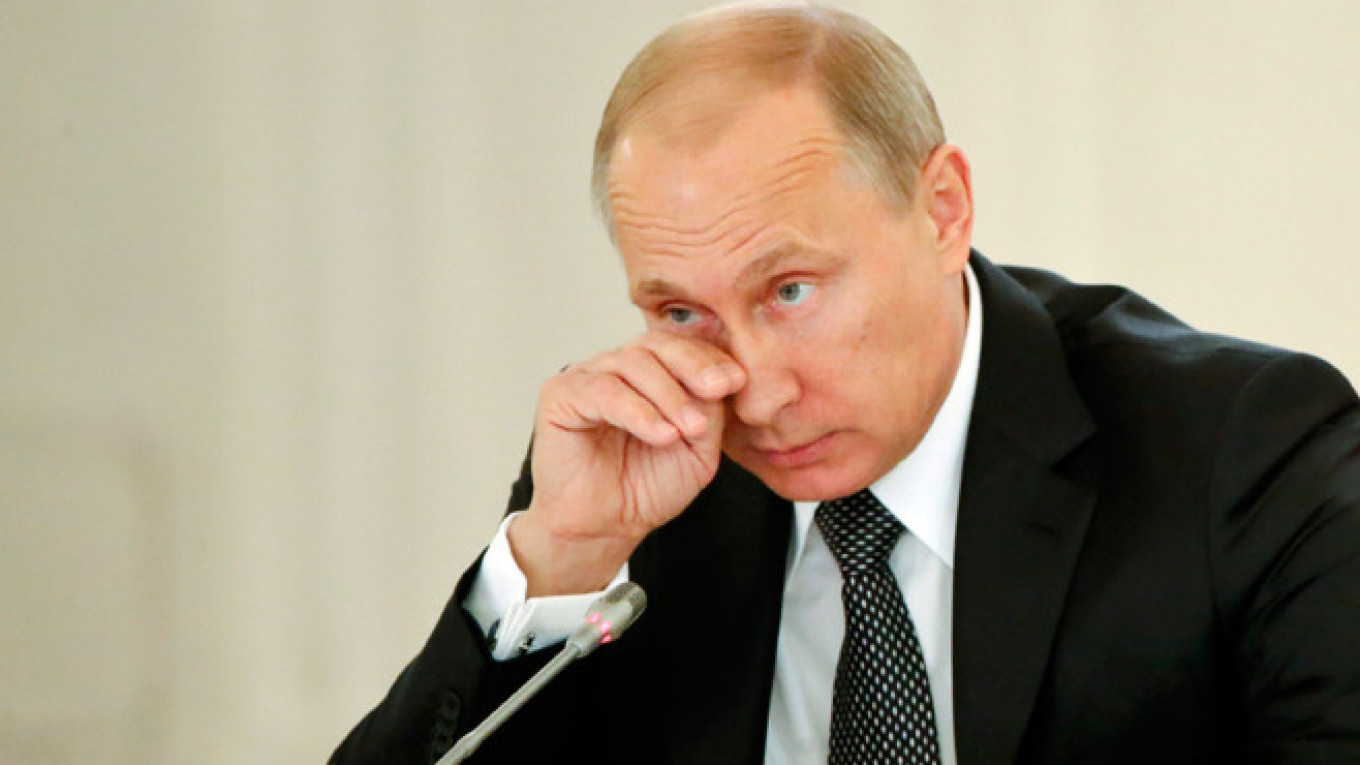It is strange to recall in 2014 that back at the beginning of his rule, President Vladimir Putin was hailed as a reformer. His main agenda during his first term in the Kremlin in 2000-04 included a cull of the swelling, ineffective bureaucracy and a municipal reform meant to foster grassroots self-governance — a prerequisite for lasting democracy and a tradition historically weak in his highly centralized country.
Putin never finished most of the reforms he started — including the most vital ones, such as regional and municipal self-governance, justice, health, education, law enforcement and democratic political procedures — having become distracted by the construction of the power vertical.
Reformist drive surged again when he installed Dmitry Medvedev as his placeholder in the Kremlin in 2008-12. While Medvedev's role as Putin's proxy is, in retrospect, obvious, his pledges to improve the business climate, build a high-tech economy and reform health care, education and the remaining social services generated a lot of enthusiasm.
Medvedev's promises were never fulfilled either, and the disappointment at his stepping-down in favor of Putin without having seen through any reforms triggered the street protests of 2011-13, the biggest in two decades.
Putin, 61, has embraced increasingly conservative policies since his return to the Kremlin in 2012, whether because he is stuck in a governing rut or simply growing old and reluctant to change (or both). But an in-depth 2012 study by the Center for Strategic Research in Moscow — the only think tank to accurately predict the protests — indicated that, contrary to stereotypes, what the Russian public wants the most is not nationalist purges or a revival of Soviet imperialism, but a revamp of the country's social institutions. The study went on to say that creating efficient institutions was the only thing that Putin's government had proven itself incapable of doing. By way of reaction, the think tank's director, acclaimed economist Mikhail Dmitriyev, was eventually fired from his job.
As of 2014, most public institutions in Russia are defunct or disintegrating rapidly. The political system is not worthy of its name: The parliament is full of populist loyalists, the "non-systemic" (i.e. real) opposition is banned from the ballots and reduced to blogging, and the government is a kleptocracy with no strategic vision (though not without exceptions, predominantly in the "economic bloc" of ministries). The media, which were just targeted by a punitive law with very few exceptions, are reduced to either Kremlin sycophants or oppositional castigators, neither side caring much about professionalism, balanced coverage or avoidance of outright bias: more propaganda than media proper.
The investment climate is dismal, and private business is treated by the state as a form of natural resources to be taxed clean instead of extracted. Supposedly free health care is in fact funded by patients' bribes, and medics quit state clinics in droves because of the laughable pay. The outdated education system is being choked to death by bureaucrats, and students study for diplomas, not knowledge. The pension system is about to be dismantled.
The list above comprises only the highlights. Russia is overdue for reforms so deep that it means rebuilding the country from scratch. For now, Putin's government is going out of its way to stall development and in effect de-modernize the country, but history always gets its due — and when it does, it will be time to update Russia on all fronts.
In that sense, the worst legacy of the past 15 years is how ill-equipped Russia is for discussing or implementing reform. Even a sensible populist like opposition leader Alexei Navalny looks like a paragon of political thinking compared with the hypocritical caveman conservatives who dominate the political mainstream with ideas such as banning the Internet or lace panties in Russia.
There has been no serious public discussion on vital issues for years, only fist-thumping and finger-pointing. Checks and balances remain an unfamiliar concept to politicians and interest groups born in the shadow of the power vertical who know orders and obedience, but not discussion or compromise. Strategic policymaking is no more common than unicorn breeding, outside a small circle of competent but non-influential experts.
And all of the above are mandatory for decisions on matters such as migration policy — now reduced to "let's ban everyone who comes from Central Asia" — federalization or education reform, for which not even countries with better developed political cultures have a universal solution. Those issues, which are increasingly pulling Russia behind the rest of the developed world, will have to be tackled one day without cheap populism or faking the effort. And it looks like it will take a lot of pain and mistakes until the nation gets it right.
This story begins a series of analytical articles and editorials in The Moscow Times about Russia's long-term strategic prospects.
A Message from The Moscow Times:
Dear readers,
We are facing unprecedented challenges. Russia's Prosecutor General's Office has designated The Moscow Times as an "undesirable" organization, criminalizing our work and putting our staff at risk of prosecution. This follows our earlier unjust labeling as a "foreign agent."
These actions are direct attempts to silence independent journalism in Russia. The authorities claim our work "discredits the decisions of the Russian leadership." We see things differently: we strive to provide accurate, unbiased reporting on Russia.
We, the journalists of The Moscow Times, refuse to be silenced. But to continue our work, we need your help.
Your support, no matter how small, makes a world of difference. If you can, please support us monthly starting from just $2. It's quick to set up, and every contribution makes a significant impact.
By supporting The Moscow Times, you're defending open, independent journalism in the face of repression. Thank you for standing with us.
Remind me later.






